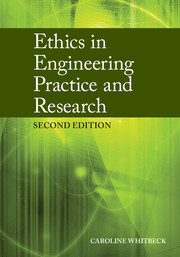Book contents
- Frontmatter
- Contents
- Note to Students
- Foreword to the First Edition
- Preface to the First Edition
- Acknowledgment
- Acknowledgments to the First Edition
- Part 1 Values and the Evaluation of Acts in Engineering
- Part 2 Engineering Responsibility
- 3 Ethics as Design ??? Doing Justice to Moral Problems
- 4 Central Professional Responsibilities of Engineers
- 5 Computers, Software, and Digital Information
- 6 Rights and Responsibilities Regarding Intellectual Property
- 7 Workplace Rights and Responsibilities
- Part 3 Responsible Research Conduct
- Part 4 The Future of Engineering
- References
- Index
6 - Rights and Responsibilities Regarding Intellectual Property
Published online by Cambridge University Press: 05 June 2012
- Frontmatter
- Contents
- Note to Students
- Foreword to the First Edition
- Preface to the First Edition
- Acknowledgment
- Acknowledgments to the First Edition
- Part 1 Values and the Evaluation of Acts in Engineering
- Part 2 Engineering Responsibility
- 3 Ethics as Design ??? Doing Justice to Moral Problems
- 4 Central Professional Responsibilities of Engineers
- 5 Computers, Software, and Digital Information
- 6 Rights and Responsibilities Regarding Intellectual Property
- 7 Workplace Rights and Responsibilities
- Part 3 Responsible Research Conduct
- Part 4 The Future of Engineering
- References
- Index
Summary
Individual Credit and the Ownership of Innovation
How broadly should one share ideas? How readily should one copy the ideas of others? Does it matter what the ideas are or the human wants and needs that those ideas help meet?
The best-known philosophical argument for the existence of property rights is that of John Locke, mentioned in Section 4 of the introduction. Locke argued that people have some rights that are “natural” in the sense that they exist prior to any contracts or agreements; among these are certain property rights. The basic right for which Locke argues is the right to the fruits of one's labor. Locke assumes the right to one's own body and argues that if one performs work or mixes one's labor with some freely available material, one owns the product. Locke gives the example of gathering acorns leading to one's ownership of the resulting accumulation of acorns. (Acorns are nourishing although bitter tasting. They were plentiful in England, and sometimes people had subsisted on them.) Locke recognized that people might make trades and other agreements that lead to the acquisition of property rights other than those that are the direct fruits of one's labor.
By extension (and assuming one has a right to one's own mind or intellect parallel to one's right to one's body), one may argue that intellectual labor involved in the creation of research, artistic, and technological works provides the basis of property rights. If the creators of the product in question are paid for producing the product, then arguably the product and any resulting trademarks, patents, copyrights, or other property rights belong to the employer or client who paid them (although the creators still deserve credit as authors or inventors of those patented or copyrighted creations). Saying that patents and copyrights are “property rights” and therefore alienable allows that they may not reside with the creators of the items patented or copyrighted.
- Type
- Chapter
- Information
- Ethics in Engineering Practice and Research , pp. 211 - 226Publisher: Cambridge University PressPrint publication year: 2011



